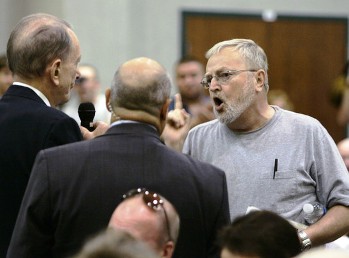This past summer, social interaction has been a disgrace.
I’m talking about the lack of civility brought about by the health care debate. Among the most demonstrative was an interchange between Massachusetts Congressman Barney Frank and a constituent.

Holding up a picture of President Obama altered to look like Adolph Hitler, a woman asks, “Why are you supporting this Nazi policy?”
A clearly frustrated and unapologetic Frank responds: “On what planet do you spend most of your time?” Calling her approach, “vile, contemptible nonsense,” he closes by saying, “Trying to have a conversation with you would be like arguing with a dining room table.”
And yet, that exchange was mild compared to the onslaught of loud and loutish behavior at some meetings that have turned what should be a civil dialogue into some kind of major league event to see who can be the most boorish.
In response to a piece I posted on Huffington Post entitled, “Hate Speech” (Aug. 18) in which I criticized the bigoted, personal attacks against President Obama from Rush Limbaugh and Glenn Beck, one reader defended their actions by saying, “Ever heard of the free marketplace of ideas…?”
I wonder how this reader would react if I were to confront him with the same kind of personal attack rhetoric he so easily defends as belonging to the “marketplace of ideas”?
“…the basic principles of civility,” author Stephen Carter points out in his book of the same name, “– generosity and trust – should apply as fully in the market and in politics as in every other human activity.
“Civility requires that we express ourselves in ways that demonstrate our respect for others.”
Respect for others does not diminish one’s right criticize, nor does it weaken the argument itself.
“Criticism,” Carter points out, “is the beginning of dialogue, and, in a vibrant democracy, dialogue is what citizens do.”
Civil, reasonable, calm dialogue – not shouting, not personal attacks, not hate speech.
But what if someone is rude to you? Must we always be polite?
“Let’s not lose sight of our own standards of behavior,” P.M. Forni writes in his book, Choosing Civility.
“It is possible to be civil and true to one’s beliefs at the same time. The issue is not whether to stand firm or compromise but how to express our firmness. When we express it with poise rather than rudeness, not only are we truer to our better selves, but we infuse our dissent with a power that it wouldn’t have otherwise.”
With the country facing so many critical issues, we need rational debate in the marketplace of ideas. That’s what works in the long run. And that’s what will see us through to a rational solution.
Comments










